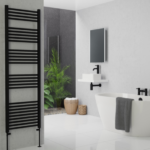When wondering how to choose a bath, many users find themselves in a rather difficult situation. Indeed, in reality, sellers of plumbing stores offer their customers to buy a bathtub from a wide variety of materials, while plumbing models have a huge variation in size, volume and shape.
Bathtubs of different material can be bought accordingly:
Acrylic bathtubs – an extravaganza of design ideas in the world of plumbing
Acrylic bathtubs are “cheap” and “expensive”. It all depends on the technological method of production of sanitary ware and the materials used. Acrylic itself is a type of elastic, durable and smooth plastic, but in a plumbing store you can buy an acrylic bathtub made of the following materials:
Acrylonetrile butadiene styrene + polymethyl methacrylate;
100% polymethyl methacrylate.
Polymethyl methacrylate itself is quite an expensive material, but it has high strength, low water absorption, and a glossy smooth surface. A bathtub made of pure PPMA with intensive use in a city apartment can live for 12 years or more, however, the price for this plumbing will be 2-4 times higher than for bathtubs made according to a two-component scheme.
In acrylic bathtubs made according to the ABS/PMMA scheme, the outer glossy layer of polymethyl methacrylate makes up only 5-10% of the total wall thickness. It is clear that such a thin layer in 3-5 years can easily be worn out due to operation. After abrasion of the first layer, the bottom layer of ABS begins to absorb moisture intensively, after which all plumbing becomes unusable.
The hygroscopicity of ABS is not at all like a sponge, no, it’s just that the structure of this type of plastic is porous and, mainly, this material is intended for the basis of plumbing, but not as a front surface.
Acrylic bathtubs from well-known manufacturers are of high quality. Their walls do not sag when the font is full, and nothing happens to the acrylic coating itself even when using water with a temperature of 70 °. It turns out that if the choice is on “acrylic”, then when deciding which bath to choose, the main criterion is the technological scheme of its manufacture.
For example, if you need to install a bath in a city apartment, then it is better to spare no expense and buy plumbing made from pure polymethyl methacrylate. If we are talking about installing a bathtub in the country or, in general, it is planned to rarely use it, then here you can save a little and buy an ABS/PMMA acrylic bathtub.
Quarry bathtubs – modified acrylic
Relatively recently, kvaril bathtubs appeared on the Russian plumbing market. Mostly, all sanitary ware made of quartz is represented by the products of the German company Villeroy & Boch AG, which is the legitimate developer of the new material and technology. The composition of the quartz material consists of acrylic and fine quartz sand.
During hardening of such a composition, a structure is obtained when each quartz sand grain is enclosed in an acrylic shell, while each grain of sand is associated with a neighboring similar particle. In practice, the material turned out to be visually smooth very similar to acrylic, however, quaril is superior to acrylic in strength and wear resistance.
The wall thickness of a quaryl bath is approximately 9-10 mm, while if acrylic plumbing was necessarily reinforced on the outside with several layers of polymer-impregnated fiberglass, then quaryl baths do not have such reinforcement. Another feature of the quartz bath is the ability to purchase and operate a model that does not require a power metal frame to install.
There are a huge number of models of quartz bathtubs that are visually similar to cast iron and which are installed on legs. Familiar classics, created from modern materials. Among the shortcomings of acrylic baths, one can single out their relatively large weight compared to acrylic sanitary ware, and their high cost.
Ceramic bathtubs – the choice of real aesthetes
Ceramic baths, according to the method of manufacture and materials, are divided into faience and ceramic-metal. In terms of cost, faience plumbing is the most expensive. It is made from fanirton – fireclay faience, that is, noble varieties of white clay. Fanirton itself, even after high-temperature firing, is a very hygroscopic material with water absorption up to 16%. For this reason, after the formation of the bowl of the font and the passage of its temperature hardening, a layer of acrylic glaze is applied to the surface of the fireclay faience.
Ceramic-metal bathtub differ significantly in manufacturing method and cost. During their production, a metal frame is initially assembled – the base, which is subsequently enveloped in alumina and subjected to high-temperature firing, followed by glazing. The main difference between cermets and pure ceramics is the smaller thickness of the font walls and a much lower weight. The price of cermets is lower than pure ceramics. This is mainly due to the lower consumption of expensive white clay.
As for the models of ceramic bathtubs, in the Russian plumbing market, bathtubs with classic oval shapes are most often found. The color can be white, blue, turquoise, beige, and even coffee. Much less often, ceramic bathtubs with unusual shapes in the form of a round saucer, with regular geometric angles or with a font in the form of a figure eight appear on sale.












